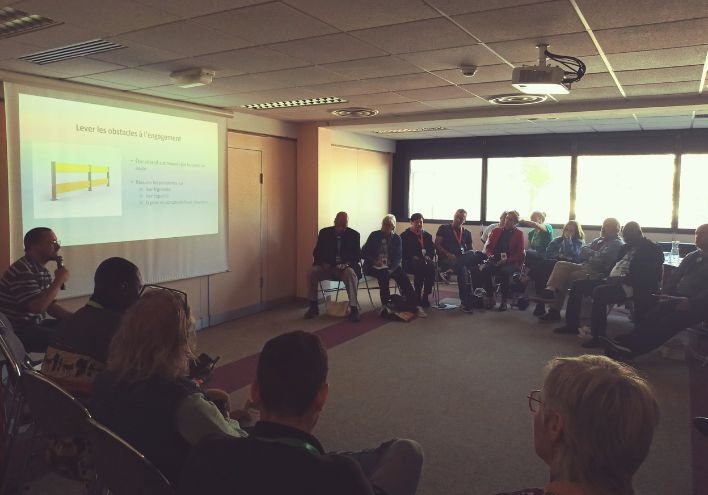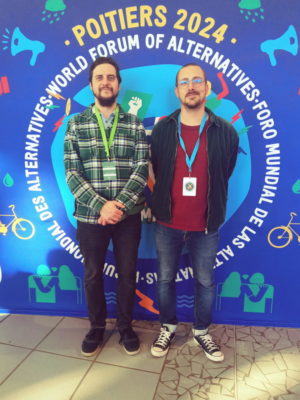Are Our Groups and Activities Truly Participatory?

![]() Reading time 5 minutes
Reading time 5 minutes
“There is a saying: ‘If they don’t invite you to the table, bring your own chair’. But once you get there, you can’t just be the centrepiece: something that’s sitting at the table that everybody talks over and around, but does not include.
Maryann Broxton, ATD Fourth World International representative to the United Nations in New York. Excerpt from her comments on participation recorded in connection with this forum.
Do we reflect enough on participation in the activities we undertake with our teams, other ATD Fourth World members, or partner organisations? Do other partners—such as university professors, public sector workers, and social workers—truly recognise and consider the knowledge and experience of people living in poverty? While the concept of citizen participation is gaining traction in the development and evaluation of public policies, many formal participatory or democratic processes are still not designed to naturally include those facing exclusion.

Two members of ATD Fourth World’s International Relations and Advocacy Office, Baptiste Bouju, and Jan Świątek, presented these issues during a workshop on the effective participation of excluded individuals at the 2nd World Forum of Alternatives. The forum, organised by Emmaüs International was held in Poitiers, France, from 17 to 20 September 2024.
What do we mean by “participation”?
The workshop was called “Is My Group or Action Really Participatory?”. More than 20 people attended from a variety of countries, including Brazil, Burkina Faso, Finland, France, Lebanon, Mali, Palestine, and Poland.
Baptiste and Jan began by asking each participant to define what “participation” meant to them and how they envisioned implementing it within their own groups. They then shared ATD’s perspective on what constitutes effective participation for the people concerned:
- Everyone—especially those experiencing poverty—has the right to participate in analysing their experiences and the actions taken to address poverty. (Fundamental Right)
- The experience and knowledge people have of their own situation is essential to a thorough understanding of the experience of poverty. (Knowledge)
- The knowledge of people experiencing poverty complements the knowledge of other groups. Together, this shared understanding strengthens our empowerment and enhances our collective ability to improve living conditions—starting with those of people experiencing poverty. (Collective – Empowerment)
Baptiste and Jan then talked with the workshop participants about the importance of the participatory approach for implementing methods or techniques into practice. In this context, they presented the Merging of Knowledge inclusive methodology using part of ATD’s documentary film on this topic. They also presented several examples of projects where the Merging of Knowledge approach fostered full and effective participation of all participants, such as the “Hidden Dimensions of Poverty” research (and the follow-up conference at the World Bank and the International Monetary Fund), the “Family Advocacy Project“, and the “Towards a Europe that Leaves No Youth Behind” campaign. These projects were further documented in detailed reports and later shared during the forum.
In the last part of the workshop, the participants were asked to share their opinions. To begin, they discussed the following topics:
- the obstacles (financial, organisational, and psychological) that can dissuade people from getting involved in a participatory process;
- the obstacles (of the same type) to maintaining long-term participation;
- key elements that help ensure full participation during a meeting.
The participants then read an excerpt from ATD France’s brochure on how to ensure successful participation (“Réussir la participation de toutes et tous“) and analysed whether or not their groups actually followed the best practices listed in the excerpt. They also discussed the issue more broadly, proposing other best practices for full participation and identifying counterexamples. This helped them understand, among other things, the problems various Emmaüs groups were encountering (such as misunderstanding the role of the board of directors) and to identify positive examples of participation (such as when the facilitators step back during consultations, leaving Emmaüs companions alone in the room—allowing them the freedom to express their views).
The workshop concluded with a short video featuring Maryann Broxton, where she discussed her perspective on full participation and how to achieve it.
By clicking on the video you accept that Vimeo drop its cookies on your browser.
Play with Vimeo
Sharing of practices
Outside the workshop, Baptiste and Jan had the opportunity to make many interesting and promising contacts. In the organisations’ village, they distributed copies of the reports mentioned above and learned about the activities of other groups and organisations from many areas around the world. One Emmaüs group, for example, wants to focus in the near future on an international campaign for social and environmental justice, similar to the work of ATD Fourth World.
The forum featured a range of activities, including visits to the city of Poitiers, the Futuroscope theme park, and evening concerts. Jan also visited the local Emmaüs group in Châteauroux-Niort, where he observed how people experiencing poverty and those who support them, live together in a community, assist one another, and secure employment. He discovered that some group members are employed through the Zero Long-Term Unemployment Zones initiative, located near the Emmaüs house. The visitors then visited a farm where people bring various used items that are sorted and then sold.
Like the actions of ATD Fourth World, the Emmaüs forum addresses the causes of poverty. In particular, it encourages participants to think together about what real participation is and to ask themselves whether they are truly making sure that, rather than simply being the topic of discussion, people experiencing poverty actively participate in discussions.
Do our teams and activities truly allow people experiencing poverty to participate fully? This is a crucial issue because without such participation, we cannot effectively combat poverty.
Recognising the obstacles faced by people experiencing poverty and working to overcome them is a crucial first step toward enabling their full participation. This marks progress toward building a truly inclusive democracy where everyone has a place and a voice, bringing us closer to a world free from poverty.

